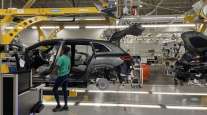Senior Reporter
House Panel Approves WIOA Bill

[Stay on top of transportation news: Get TTNews in your inbox.]
Legislation meant to facilitate access to employment opportunities and training for certain job seekers recently was approved by a U.S. House panel.
The Education and Labor Committee on April 5 gave partisan backing to an update of the Workforce Innovation and Opportunity Act (WIOA).
The bill, which advanced to the House floor for consideration, would reauthorize WIOA programs for six years. It also would fund workforce development systems to ensure prospective employees gain access to long-term careers.
Workforce Innovation and Opportunity Act by Transport Topics on Scribd
The measure’s sponsors argued federal investment in workforce development is crucial to assist the economy.
“Underinvesting in workforce development allows other economies to outcompete us,” committee Chairman Bobby Scott (D-Va.) said. “While other developed countries spend half to 1% of their gross domestic product on workforce development, the United States only spends one-tenth of 1%. Our nation’s economy has a stake in how well we do our job here today.”
Under the bill, U.S. Department of Labor’s workforce development programs would be backed by $74 billion by 2028 to primarily assist about a million workers annually. The bill would establish a Department of Labor program to assist with the transition to employment for individuals released from incarceration, expand summer and year-round youth employment opportunities, and re-emphasize partnerships between employers and community colleges for high-quality training programs.

Host Michael Freeze discusses the future of tire maintenance with Yokohama's Tom Clauer and Goodyear's Austin Crayne and Jessica Julian. Hear a snippet above, and get the full program by going to RoadSigns.TTNews.com.
Additionally, the bill would enhance stakeholder partnerships via myriad workforce development operations, according to background the committee provided.
“The Biden-Harris administration is helping our economy recover from the COVID-19 pandemic and getting Americans back to work. We currently have record low unemployment and record job growth, yet job openings currently exceed applicants and employers are clamoring for skilled workers,” Scott added. “To remedy this, it is essential we reauthorize WIOA and expand access to high-quality job training opportunities.”
The legislation’s consideration in the chamber has yet to be scheduled. The panel also advanced along party lines the Protecting America’s Retirement Security Act, which is meant to “continue to help workers, families and employers. This bill takes important steps to help Americans plan and save for a dignified retirement,” Scott explained.
Committee Democrats just advanced two bills that harm workers, job creators, taxpayers, and retirees.
See @virginiafoxx's statement https://t.co/9AZiskpEja — House Ed & Labor Republicans (@EdLaborGOP) April 5, 2022
Republicans on the panel opposed the bills. The committee’s top Republican, Rep. Virginia Foxx of North Carolina, explained the GOP’s opposition: “Education and Labor Committee Democrats keep missing opportunities to work across the aisle. These bills, however well-intentioned, do not work for workers, job creators or retirees; not to mention, they hasten the creep of the federal government into the individual decisions of Americans.”
Foxx continued, “We should be trying to preserve self-government in this country, not expand the federal government’s control over the workforce or the retirement system. I hope my Democrat colleagues will reconsider these bills.”
Want more news? Listen to today's daily briefing above or go here for more info
Per the U.S. Department of Labor, WIOA requires states to “strategically align their core workforce development programs to coordinate the needs of both job seekers and employers through combined four-year state plans with greater flexibility than its predecessor program.”
“Additionally, WIOA promotes accountability and transparency through negotiated performance goals that are publicly available, fosters regional collaboration within states through local workforce areas and improves the American Job Center system,” according to the department.
Various industry stakeholders have pushed for the legislation’s enactment. American Trucking Associations, for instance, recently indicated the industry is short about 80,000 commercial drivers.



